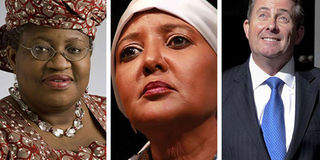Premium
Africans in race for WTO top post say only members can reform body

Nigeria's Ngozi Okonjo-Iweala, Kenya's Amina Mohamed and Britain's Liam Fox, who are among the candidates for the director-general position at the World Trade Organization. PHOTOS | FILE | AFP
What you need to know:
- In an initial session of submissions, the eight candidates pledged to make the WTO responsive to modern trade.
- Africa’s chances are higher this year, given that it has never produced a director-general since the WTO’s formation 25 years ago.
- This year’s campaigns, unlike others, have been shortened by the pandemic. Candidates were only allowed a month to submit applications.
Hopefuls for the World Trade Organization (WTO) director-general seat admit that the agency can only be reformed by member states.
In an initial session of submissions, the eight candidates pledged to make the WTO responsive to modern trade.
The candidates, including Kenya’s Amina Mohamed, Nigeria’s Ngozi Okonjo-Iweala and Abdel-Hamid Mamdou of Egypt, appeared before the General Council in Geneva on Wednesday, Thursday and Friday respectively.
The other contenders are Liam Fox of Britain, Jesús Seade Kuri (Mexico), Tudor Ulianovschi (Moldova), Mohammad Mazia al-Tualjri (Saudi Arabia) and Yoo Myung-hee of South Korea.
HIGHER CHANGES
Amina narrowly lost to Brazilian Roberto Azevedo in 2013. Africa’s chances are higher this year, given that it has never produced a director-general since the WTO’s formation 25 years ago.
Amina told the envoys she will encourage member states pursue “reform, recovery and renewal”.
“An effective WTO will help create the conditions for a sustainable recovery from the economic fallout of the Covid-19 pandemic,” she said.
“WTO was in difficulties before Covid-19 struck. Its negotiating function had faltered, with only limited successes.”
She admitted that the director-general, as an executive policy implementer, may just be as weak, if the 164 member states do not choose to make those changes.
“The membership needs to agree on reforms and priorities,” she said.
The Kenyan Sports minister has worked at the WTO, where she headed the highest decision-making organ.
NIGERIAN’S PROMISE
Ngozi Okonji-Iweala has been an MD at the World Bank and finance minister in Nigeria.
She promises “to bring a fresh pair of eyes to a WTO that appears paralysed and unable to update its rule book”.
“Overcoming these challenges will require strong engagement and commitment from members. This is the only way the WTO can produce concrete results,” she said.
She told the panel that her stint at the World Bank toughened her negotiation skills, especially on economic reforms and debt relief.
The Bank has been accused of forcing down the throats of poor nations structural adjustment programmes and conditional loans.
COMMON PURPOSE
For the Egyptian commercial law academic Mamdouh, the WTO “could be lost if it fails to get a common purpose”.
Mamdouh said his would be a different type of leadership. He too said the task of changing the WTO lies with members.
“Reforming the WTO is different from reforming other organisations. It is not about reforming administrative structures or allocating resources to projects. It is about reforming the enforceable contract among states,” he said.
“We are in the same boat but rowing in different directions. This will not hold. If the situation is not corrected, the hull will break under the tension of differences.”
Mamdouh pledged to “listen carefully to members”.
This year’s campaigns, unlike others, have been shortened by the pandemic. Candidates were only allowed a month to submit applications. They will have about 52 days to know their fate.
Selection is by consensus. After making initial pitches, candidates will continue to “make themselves known” to WTO members until September 7.
Thereafter, New Zealander David Walker, who is the chairman of the General Council, and chairperson of Dispute Settlement Dacio Castillo of Honduras as well as the head of the Trade Policy Review Harald Aspelund of Iceland, will begin consulting WTO members.





